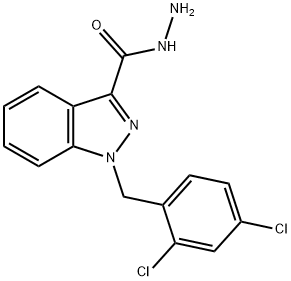252025-52-8
 252025-52-8 結(jié)構(gòu)式
252025-52-8 結(jié)構(gòu)式
基本信息
1-(2,4-二氯芐基)-1H-吲唑-3-碳酰肼
CS-2018
Adjudin
Adjudin, AF-2364
AF-2364
AF 2364
AF2364
1-(2,4-dichlorobenzyl)indazole-3-carbohydrazide
1-(2,4-dichlorobenzyl)-1H-indazole-3-carbohydrazide
1-(2,4-dichlorobenzyl)indazole-3-carbohydrazide USP/EP/BP
1-(2,4-Dichloro-benzyl)-1H-indazole-3-carboxylic acid hydrazide
1-[(2,4-Dichlorophenyl)methyl]-1H-indazole-3-carboxylic acid hydrazide
物理化學性質(zhì)
DMF:30.0(Max Conc. mg/mL);89.5(Max Conc. mM)
DMF:PBS (pH 7.2) (1:20):0.05(Max Conc. mg/mL);0.15(Max Conc. mM)
常見問題列表
| Target | Value |
|
Cl? channel
() | |
|
NF-κB
() | |
|
ERK
() |
Adjudin is a potent blocker of Cl - channels: disrupting Cl - ion transport function results in a decline in sperm capacitation and fertilizing ability in humans in vitro. Adjudin (ADD) is a mitochondria inhibitor. Adjudin is a molecule that mediates adherens junction disruption at the Sertoli-germ cell interface. To investigate the effect of Adjudin on cancer cells, more than ten different types of human or mice cancer cell lines are treated with increasing concentrations of Adjudin and the cell proliferation is measured by the modified MTT assay. Adjudin inhibits cell proliferation in a dose dependent manner in SGC-7901 (human gastric adenocarcinoma cell), MDA-MB-231 (human breast adenocarcinoma cell), Smmc-7721 (human hepatoma cell) and MIA Paca-2 (human pancreatic adenocarcinoma cell) cells. The IC 50 of Adjudin is determined to be 58.0 μM, 13.8 μM, 72.3 μM and 52.7 μM against SGC-7901, MDA-MB-231, Smmc-7721 and MIA Paca-2 cells, respectively, after treatment for 24 h. Similar results are obtained in other human and mice cancer cell lines. The IC 50 of Adjudin in A549 cells and PC3 cells is 63.1 μM and 93.0 μM, respectively. For WI-38 and BPH-1 cells, the IC 50 of Adjudin can be observed at more than 300 μM and 200 μM, respectively, which is about 5 times and 2 times more than that for the cancer cell lines A549 and PC3.
To determine whether Adjudin can inhibit lung and prostate cancer growth in vivo, the effect of Adjudin is tested in a subcutaneous model of lung and prostate cancer. Human lung carcinoma cells A549 and prostate carcinoma cells PC3 are injected into athymic nude mice subdermally at the lower back site respectively. Mice are then randomized into two treatment groups with similar mean tumor sizes: Adjudin and vehicle (control). Approximately 2 weeks after tumor inoculation Adjudin is injected intraperitoneally once every three days in lung carcinoma cells and every other day in prostate carcinoma cells at 100 mg/kg. Adjudin treatment can be well tolerated in rodent. And Adjudin-treated mice show significant tumor growth inhibition compared with the control group (P<0.0001 in the human lung carcinoma cells A549 and P=0.006 in the prostate carcinoma cells PC3).
